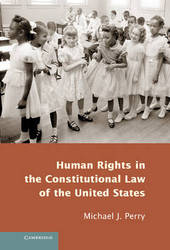
|
Human Rights in the Constitutional Law of the United States
Hardback
Main Details
| Title |
Human Rights in the Constitutional Law of the United States
|
| Authors and Contributors |
By (author) Michael J. Perry
|
| Physical Properties |
| Format:Hardback | | Pages:196 | | Dimensions(mm): Height 229,Width 152 |
|
| ISBN/Barcode |
9781107038363
|
| Classifications | Dewey:342.73085 |
|---|
| Audience | | Professional & Vocational | |
|---|
|
Publishing Details |
| Publisher |
Cambridge University Press
|
| Imprint |
Cambridge University Press
|
| Publication Date |
8 July 2013 |
| Publication Country |
United Kingdom
|
Description
In the period since the end of the Second World War, there has emerged what never before existed: a truly global morality. Some of that morality - the morality of human rights - has become entrenched in the constitutional law of the United States. This book explicates the morality of human rights and elaborates three internationally recognized human rights that are embedded in US constitutional law: the right not to be subjected to cruel, inhuman or degrading punishment; the right to moral equality; and the right to religious and moral freedom. The implications of one or more of these rights for three great constitutional controversies - capital punishment, same-sex marriage and abortion - are discussed in-depth. Along the way, Michael J. Perry addresses the question of the proper role of the Supreme Court of the United States in adjudicating these controversies.
Author Biography
Michael J. Perry holds a Robert W. Woodruff Chair at Emory University, where he teaches in the law school. Previously, Perry held the Howard J. Trienens Chair in Law at Northwestern University, where he taught for fifteen years, and the University Distinguished Chair in Law at Wake Forest University. Perry has written on American constitutional law and theory; law, morality and religion; and human rights theory in more than sixty articles and eleven books, including The Political Morality of Liberal Democracy, The Idea of Human Rights, We the People: The Fourteenth Amendment and the Supreme Court, Under God? Religious Faith and Liberal Democracy, Toward a Theory of Human Rights: Religion, Law, Courts, and Constitutional Rights, Moral Controversy, and the Supreme Court.
Reviews'Michael J. Perry has done it again, offering new and provocative insights about political morality, human rights, and constitutional law. Writing with clarity and grace, [he] connects the morality of international human rights, which is grounded in 'a spirit of brotherhood', to the constitutional morality of the United States. In so doing, he provides a rich and nuanced perspective for examining the death penalty, same-sex marriage, and abortion, casting these issues in a new light and permitting an analysis that is novel, penetrating, and powerful.' Daniel O. Conkle, Robert H. McKinney Professor of Law, Indiana University Maurer School of Law 'Professor Perry's is a major voice in the areas of religious freedom, human rights, and constitutional jurisprudence. This is an engaging work that presents important new arguments about the constitutionality of capital punishment, same-sex marriage bans, and criminal abortion restrictions. It will be of interest to specialists of both U.S. constitutional law and international human rights law.' Frederick Mark Gedicks, Guy Anderson Chair and Professor of Law, Brigham Young University Law School 'Michael Perry's new book is an incredibly clear and succinct account of the development of the basic standards of international human rights, and of their underlying principles. It also presents powerful arguments for how these should relate to constitutional rights in the United States, including a right of same-sex marriage as an exercise in religious and moral freedom, an abolition of the death penalty as 'cruel and unusual' punishment, and a moderate, constrained protection of abortion, given the controversial status of the fetus.' Kent Greenawalt, University Professor, Columbia University School of Law 'The fruit of years of intellectual discipline and moral commitment, this book recasts and re-evaluates American constitutional law in terms of the morality of human rights - what Perry rightly terms the first 'truly global political morality'. The book's compelling interdisciplinary insights will cause seasoned scholars to rethink their positions, while the clarity of its analysis makes it suitable for those just beginning their studies.' M. Cathleen Kaveny, John P. Murphy Foundation Professor of Law and Professor of Theology, University of Notre Dame
|